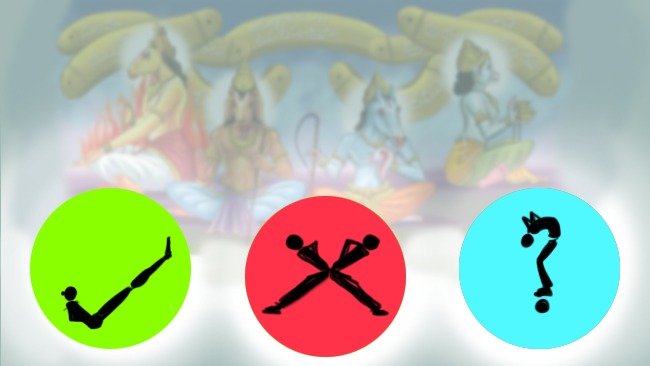For a student who wants to excel in an examination, right thing to do is to study and revise the relevant topics from the syllabus. For a father who wants to give his children opportunities to earn a wonderful living, right thing to do is to plan their education and aid their overall development etc. For a Prime Minister of a country who wants peaceful and happy people, the right thing to do is to come up with a system of schemes that allow people of the country to grow individually as well as a society by making the best use of their skill sets.
But, if the student, the father and the Prime Minister are also mumukshus, i.e. true seekers whose goal also includes: to know who they really are, what their ultimate goal is, who the source of creation is, then Vedam defines the same activities for them but provides a way to sanctify them by cleansing the thought behind their work.
By working in this manner, they will not only be successful and happy during the current endeavours of preparing for exam, earning for a family, or planning for the country etc. but also evolve themselves towards eternal bliss, the ultimate goal and contribute holistically to a better world for current and future generations.
This prescription given by Vedam encompasses the right things and right ways to know for anyone based on three prama:nams, i.e. means of acquiring knowledge that one should believe in order to reach the goal (mumukshus).
- Pratyaksham [knowledge obtained directly through the sensory organs]
- Anuma:nam [knowledge obtained as a result of inference, i.e. known sequence of events from past experiences – ex: knowledge that there is fire somewhere in the surroundings when we see smoke]
- A:ptha va:kyam/Sa:stram/Vedam [knowledge given or shared by great seers who wish for the well-being of yourself and the entire creation]
Most of us are fine with the first two, pratyaksham and anuma:nam as means of knowledge. But, first two are not enough to build our gna:nam, knowledge to its fullest. How do we know who these well-wishers are?
We can try to recognise them by observing the way they conduct their life. Goda Devi introduces to us, ten states of such great well-wishers (in the form of gopikas in her songs). It is important to be associated to them, seek their company and assistance, raise up to such states one by one, and continue to be with them. It is only the association with such great people, that our ignorance will begin to shed off. Ultimately though, only God’s blessing helps you reach the goal. You may ask – If it is only his blessing, then what is the purpose of associating to all the great people? Such association helps you prepare for the state of bliss that HE will grant. If you understand the true nature of God, you will always want to be associated to these great devotees and a:charya:s. Vedam recommends this is the way to ‘Make your Journey towards the bliss as heavenly as the resulting state’.
Arjuna asked Krushna, “What do your devotees do?” Krushna declared in Bhagavad Githa –
sathatham ki:rthayantho:ma:m yathanthascha drudavra:tha:ha namasyanthascha ma:m nityam thushyanthicha ramanthi cha
HE said, “They are always doing their own activities joyfully as a sacred duty and are enjoying the glory of mine along with other devotees, in whichever activity they may be in. They utilise their body and their activities as instruments in serving me.”
These devotees have different beautiful states of mind. They are categorised by Goda Devi in her 10 key songs in Tiruppavai.
[table id=7 /]


